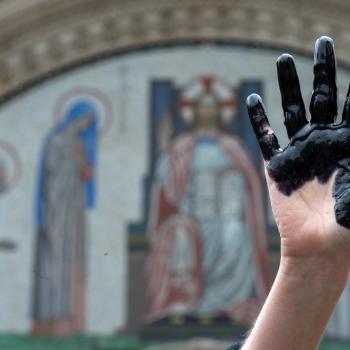 This week, Trump declared himself to a nationalist. “America First” is, as many have known it to be, a right-wing nationalist cause. Trump and his followers selfishly reject the common good in the world, seeking their own gain at the expense of others.
This week, Trump declared himself to a nationalist. “America First” is, as many have known it to be, a right-wing nationalist cause. Trump and his followers selfishly reject the common good in the world, seeking their own gain at the expense of others.
By saying, “America First,” we must not think Trump will treat everyone in America equally. As his policies have consistently shown, he supports the rich over the poor, and so when he says “America First” he means only those selected people he prefers will receive his good graces while the rest of the world burns. He will highlight how he has helped some people in America, focusing on them, saying he is putting America first, but in reality, he is not concerned with Americans as a whole, even as he is not concerned with what happens in the rest of the world so long as the world does not interfere in his own private interests. The end result is not going to be well for America or for the rest of the world: when the whole world is improved, Americans will benefit from this and feel that improvement as well, but when the world suffers due to bad American policies, Americans will suffer the consequences of those policies as well. This can be seen in Trump’s trade war, where his tariffs will hurt Americans more than any positive effects he says they will receive from them: America First, in some ways, means Americans will have to bear the burden of these bad policies first above all others.
Christians, of course, do not have to look at this merely as a thing of economics. Christianity teaches that the proliferation of goodness is God’s intended plan for creation. Dionysius, talking about this providential work of God, describes it in many fashions, including as an interdependent chain of goodness which flows through all being, bringing all being back to the source of the good, God himself:
Come, let us gather all these once more together into a unity and let us say that there is a simple self-moving power directing all things to mingle as one, that it starts out from the Good, reaches down to the lowliest creation, returns then in due order through all the stages back to the Good, and thus turns from itself and through itself and upon itself and toward itself in an everlasting circle.[1]
Trying to stop the free distribution of the good creates the lines of friction which end up going up in flames. “America First” is about the United States (and within the United States, a further, more limited group) gaining inordinate power and authority over others, using that power not for the common good, but for private interests. Selfishly halting the free distribution of the good, given over by God, runs contrary to God’s will, and is a strong indication of grave sin.
The dangers which come from the selfishness promoted by the right-wing nationalistic ideology can be seen in the way the right-wing denigrates foreigners, constantly belittling their human dignity. Those who are most in need of aid or seek refuge are attacked and criticized, indeed, demonized, leading to excuses as to why their needs can be ignored, even if they suffer or die as a consequence. Human life is no longer sacred, but a thing easily snuffed out without concern. Currently, this can be seen in the way a large caravan of poor, displaced migrants, making their way through Mexico, find themselves being rebuffed by the Trump administration and its supporters. Trump not only has demonized them, trying to undermine their needs by suggesting they are criminals and terrorists without any proof, but wants other people to support “America First,” and do the dirty work to prevent the caravan from coming to the United States: if they do not do so, they are being told Trump will cut off any financial aid the United States has otherwise promised to give them.
Contrary to their claims of disengaging the world, with their attacks on “globalism,” this shows Trump and his supporters actually want the United States to continue to engage the world, but to do so in a way in which the United States gets to dictate to the rest of the world its desires, whether or not they are just. This is what “America First” nationalism is about – it is about establishing a global order and power structure that seeks to dominate the world: it is setting up a new world order in which elite nationalists in America determine what the rest of the world must do to support American policies. This is exactly how other brutal military states have tried to stake their claim to the world. They demand to be treated with deference, and if not, they threaten retribution
Instead of dominance, the United States must work to rectify the situation. With its power and money, it must work as a humble servant for the good of the world, and not for itself alone. The United States, which has benefited from its relationships with the nations of the world, has a responsibility to those nations and the people within them. This means, as Joseph Capizzi from Catholic University of America said in regards to a previous caravan, the United States has a duty to treat the people in the caravan with mercy and justice, checking their status and needs and giving to those who are in need, as well as working to change the world situation which has made for the need for such caravans to exist. Thus, Bishop Joe Vásquez, Chairman of the US Bishops’ Conference Committee on Migration, said that we must provide for these migrants, for they need our protection and care.
Unlike Trump, with his rhetoric of hate which does not care whether or not any others are harmed so long as selfish desires are met, Pope Francis has made it clear, we live in a global community and we cannot avoid the consequences of being in that community. Even if we try to isolate ourselves, that isolation exists within the confines of that global community and is affected by even as it affects that community. We can’t be like Cain, thinking we can distance ourselves away from those in need and say we are not our brother’s keeper. Pope Benedict, likewise, understood the same thing, while indicating that the dangers involved with the current global situation requires that care must be had to make sure the right global policies are enacted. Care must be had for all who are needy, and we must recognize the structures of sin which create such need, locally as well as universally. Globalism, as Francis, Benedict, and St. John Paul II know, must exist in and through solidarity; we must work together for the common, universal good. What we see coming out of Trump is a globalism of power, not solidarity.
Globalism is impossible to avoid: we exist within a global community whether we like it or not. It is impossible to avoid; those who attempt to reject globalism on the basis of selfishness denounce the solidarity which is required, but in doing so, the consequences will be bad not just for the world, but for those who reject such solidarity as the fruit of their actions will harm everyone involved. Selfishness has only short-term ideas and short-term goals, and in the end, will be its own undoing, as every evil eats up and destroys itself. However, we must not use that as an excuse not to care: it is better to stop the evil, and stop the harm that can be done by such selfishness now, then it is to wait for its self-destruction, so that less people are harmed, and less healing will need to be done when such evil is finally eradicated.
The humanistic enterprise, promoted by the Christian faith, has always been to work for the common good, to understand that we are all in this together. Lifting up and helping the poor and needy will lift everyone up. But to reject this, to ignore them in their plight or mistreat them is to undermine our own humanity, a common nature which we share, and so to “rob” ourselves of our humanity.[2]
Under Trump, the people of the United States risk losing their humanity as it continues its downward spiral of selfishness and hate, echoing the hateful nationalism of times gone by which led to mass destruction and death in the world. Christians must reject such nationalism on the basis of the universality of the Christian message which transcends all humanly constructed borders: in Christ there is neither male nor female, slave or free, Jew or Gentile (cf. Gal. 3:28). In God’s plan for the world, there is no focus on human borders but the common good. We must resist the triumphalism of hate and debauchery which promotes death; we must promote life, and that means, the common good. We must support those in need, even if selfish people make laws which seek to hinder the common good. We must work in solidarity with the people of the world, making the preferential option for the poor and vulnerable, the foundation for our work. We must truly follow the example of God, seeking universal goodness, instead of private, selfish nationalism. If we do not, we risk Christ telling us he never knew us when it comes to the time of our judgment (cf. Matt. 7:23).
[IMG=Immigration Rally Feb. 4, 2017 By Paul Sableman (IMG_7493) [CC BY 2.0 (https://creativecommons.org/licenses/by/2.0)], via Wikimedia Commons]
[1] Pseudo-Dionysius, “The Divine Names” in Pseudo-Dionysius: The Complete Works. Trans. Colm Luibheid (New York: Paulist Press, 1987), 84.
[2] Lactantius said as much in the Divine Institutes: “If, then, to harm a man is against nature, to be of advantage to man must be, therefore, according to nature. Who does not do this robs himself of the name of man, since it is the duty of humanness to come to the aid of man in necessity and danger,” Lactantius, The Divine Institutes. Trans, Sister Mary Francis McDonald, OP (Washington, DC: CUA Press, 1964), 421.
Stay in touch! Like A Little Bit of Nothing on Facebook













